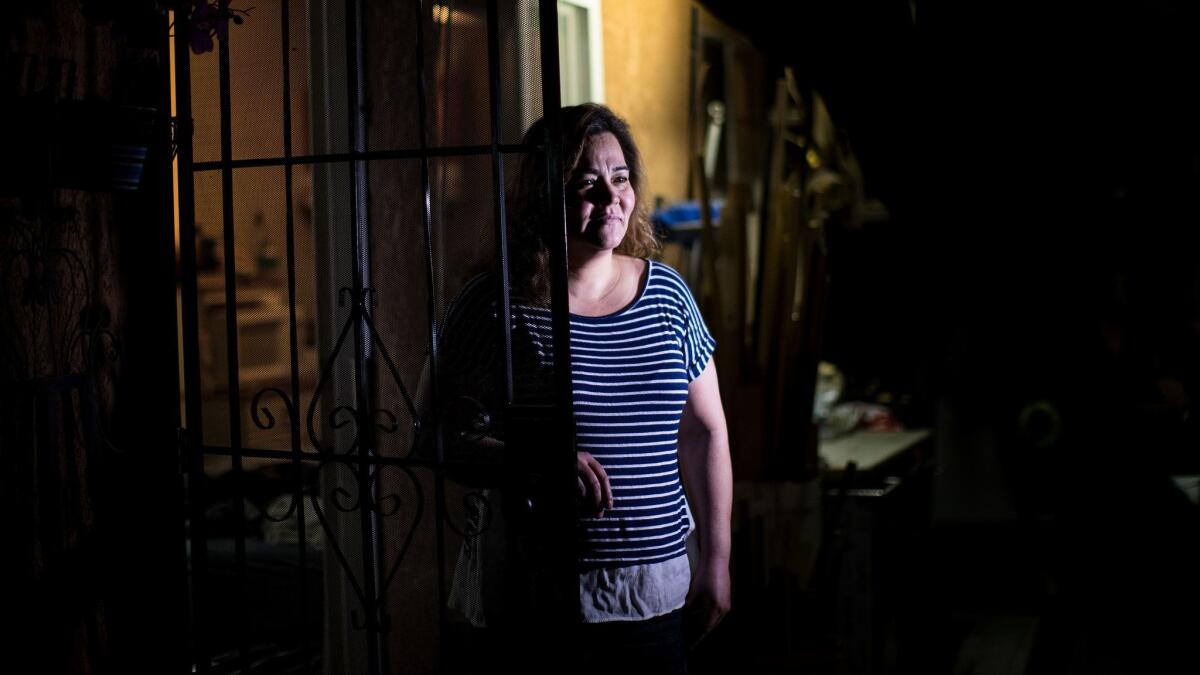Trump administration ending protections for more than 200,000 Salvadorans in U.S., but giving time for a transition

- Share via
Reporting from Washington — About 262,000 Salvadorans living in the U.S. will lose the temporary legal status that many have enjoyed for almost two decades, the Trump administration announced on Monday.
The Department of Homeland Security’s decision, which has been widely anticipated with deep anxiety in Salvadoran communities, said immigrants covered by “temporary protected status” will have until Sept. 9, 2019, to arrange a return or, in some cases, to apply for alternative legal means of staying in the U.S. The population covered by the temporary status includes nearly 30,000 people in the Los Angeles region.
Administration officials said conditions in El Salvador have improved markedly since 2001, when the Bush administration first made the special protections available in the wake of two earthquakes that devastated the small Central American country.
“Schools and hospitals damaged by the earthquakes have been reconstructed and repaired, homes have been rebuilt, and money has been provided for water and sanitation and to repair earthquake-damaged roads and other infrastructure. The substantial disruption of living conditions caused by the earthquake no longer exist,” Homeland Security officials said in a statement.
The 18-month lead time will give the Salvadorans time to pursue another means of legally staying in the U.S. — or to allow Congress to pass a law allowing them to stay, officials said.
“Only Congress can legislate a permanent solution for this,” said one official who briefed reporters on condition of anonymity.
For years, El Salvador has been racked by brutal gang violence, including from the MS-13 gang that has gained a significant presence in the U.S. But Kirstjen Nielsen, Homeland Security secretary, decided that under the law she could only consider the original conditions that led to the granting of temporary status — the damage from the earthquakes 17 years ago.
“Since then, anything else doesn’t really apply, including violence on the ground,” the official who briefed reporters said.
Advocates for the immigrants immediately protested, calling the decision needlessly cruel and a blow to the economies of both El Salvador and the U.S.
In the nearly two decades during which they have been able to live and work legally in the U.S., Salvadorans with protected status have built careers and opened businesses, and workers now play a significant role in industries like construction and housekeeping. The economy of El Salvador also is dependent on money sent back to families from abroad — $4.5 billion last year.
“The United States has yet again turned its back on its promise to provide refuge for those who face violence and persecution in their home countries,” said Oscar Chacón, executive director of Alianza Americas, a network of immigrant rights groups.
“Our government is complicit in breaking up families—nearly 275,000 U.S.-born children have a parent” who has temporary legal status, he said. Studies have estimated that Salvadorans with temporary status have nearly 200,000 children who are U.S. citizens.
Congress created the temporary status program in 1990 to give the executive branch the authority to allow migrants from countries hit by natural disasters, wars or other emergencies to remain in the U.S. and work legally for a limited period of time.
But Trump administration officials say that because previous administrations have frequently extended the temporary stays, the program has improperly been allowed to become an all-but-permanent refuge. They have been determined to roll it back.
Last year, the Department of Homeland Security announced an end to temporary protections for Nicaraguans and Haitians, and put off making a decision affecting 60,000 Hondurans.
But advocates for the Salvadorans, including close to 50,000 in California, say it is wrong to force them to return to a country suffering from high unemployment and gang violence.
Rep. Jim McGovern (D-Mass.), who helped write the temporary status law, said the administration relied on a “distorted and narrow interpretation” to cancel the program. He called the move “a shameful and cynical move to punish these innocent families just to score political points with the extreme right wing Republican base.”
Several bills have been introduced in Congress to allow people with temporary status to remain in the U.S., but no action is expected any time soon. Members of Congress may act in the next few weeks on another immigration-related issue — a permanent solution for the young immigrants who were shielded from deportation by the Obama-era DACA program — but officials in both parties consider further immigration action unlikely.
Twitter: @jtanfani
UPDATES:
9:20 a.m.: This article was updated with additional details on the decision and quotes from administration officials.
The article was originally published at 8:20 a.m.
More to Read
Get the L.A. Times Politics newsletter
Deeply reported insights into legislation, politics and policy from Sacramento, Washington and beyond. In your inbox twice per week.
You may occasionally receive promotional content from the Los Angeles Times.









